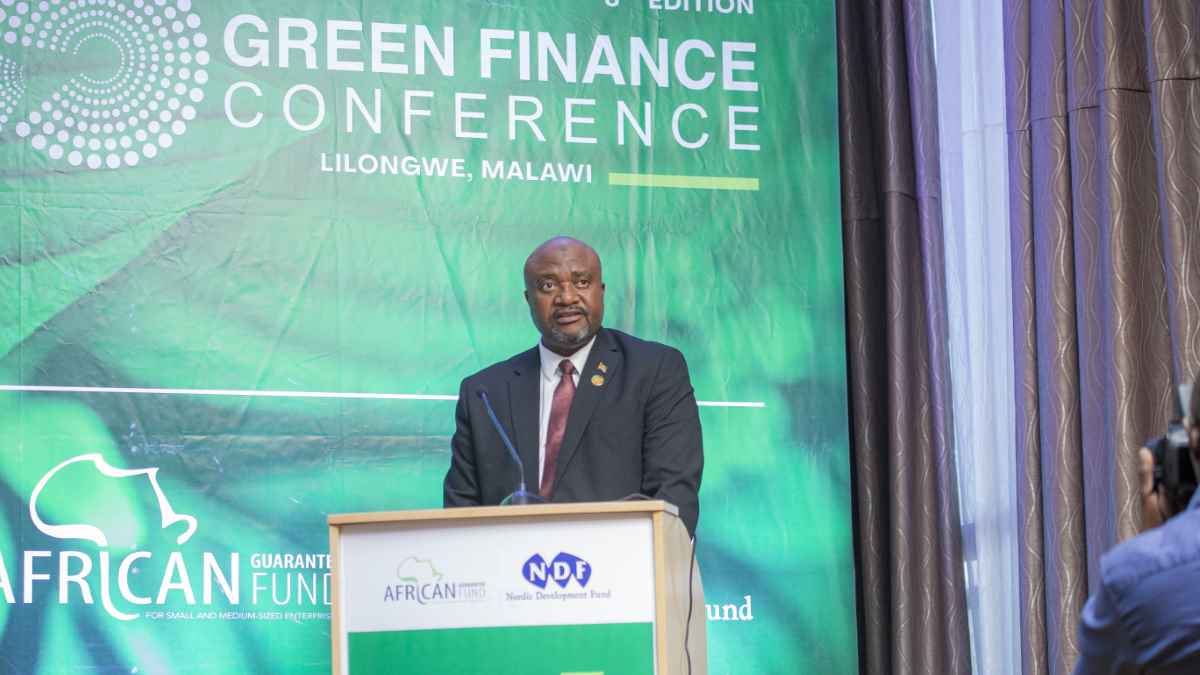Malawi’s Vision 2063 reinforces the need to increase the nation’s resilience in agricultural technology by adapting innovative technologies
LILONGWE, Malawi, May 9, 2023/APO Group/ —
The African Guarantee Fund (AGF) (http://www.AGF.Africa) in partnership with the Nordic Development Fund (NDF) kicked off the 8th Edition of the Green Finance Conference in Lilongwe, Malawi earlier today. The high-level conference attended by key players in the Malawi Finance and Energy Sectors, regulatory-policy stakeholders and Green SMEs highlighted the contribution of Malawi’s private sector to the achievement of the 2015 Paris Climate Agreement.
Download document 1: https://apo-opa.info/3Bc80WC
Download document 2: https://apo-opa.info/3VR2674
Download document 3: https://apo-opa.info/3BbhlOy
The Paris Agreement, which was adopted by 196 Parties during the UN Climate Change Conference (COP21) in Paris, France on 12th December 2015 and put into effect on 4th November 2016; enforces a global framework to avoid dangerous climate change and also strengthens and supports each countries’ ability to deal with the impacts of climate change.
Malawi’s Vision 2063 reinforces the need to increase the nation’s resilience in agricultural technology by adapting innovative technologies. Climate change decreases the rate at which Malawi can attain the goals of Vision 2063 as the country is prone to adverse climate hazards such as dry spells, seasonal droughts, intense rainfall and floods that all increase the poverty levels of the nation.
Speaking at the opening ceremony, Malawi’s Minister of Energy, Hon. Ibrahim Matola said, “Climate change is a development issue that needs to be dealt with holistically. Climate change affects the budget negatively in the sense that the Ministry of Finance has to come in with budgetary resources to implement mitigation and response mechanisms designed to minimise negative effects of climate change. Apart from budgetary allocation, climate change affects growth prospects either through drought induced shocks or flooding as has been the case with Cyclone Idai, Gombe, Ana and recently Freddy.”
The AGF and NDF have played a significant role in reducing the risks assumed by the financial sector by offering financial guarantees to support green SMEs
The Green Finance Conference emphasized the need for the full implementation of the Paris Agreement which requires private sector participation, especially the Small and Medium Enterprises (SMEs). SMEs make up over 90% of enterprises and account for up to 60% of job creation and economic development in Africa. SMEs leveraging green incentives such as the Green Guarantee Facility can only be successful through adoption of complementary Technical Assistance and support from their governments through the establishment of green financing policies.
In 2016, AGF partnered with the NDF to launch the Green Guarantee Facility which unlocks financing for SMEs investing in climate change mitigation and adaptation, thereby promoting a green growth-oriented economy. The facility aims to increase sustainable private-sector led economic growth in Africa through efficient utilisation of untapped clean energy resources and other climate-resilient development initiatives. The AGF and NDF have played a significant role in reducing the risks assumed by the financial sector by offering financial guarantees to support green SMEs that are unable to provide acceptable collateral.
African Guarantee Fund Group Chief Executive Officer, Jules Ngankam said, “An increasing number of investors are looking to invest in new asset classes that are aligned to the green transition. These investors are even willing to take a lower financial return but it has to be compensated with climate return and social return. It is no longer just about maximizing the financial return but maximizing all returns jointly.”
Since the first Green Finance Conference in Lusaka, Zambia in March 2017, AGF and NDF have continued to work together to expand access to finance for SMEs focused on Green-growth across the continent.
“The Green Finance Conference was established as a response to the challenges of climate change within the framework of Nationally Determined Contributions, to analyze available opportunities and propose solutions that are necessary to meet the financing needs of Green SMEs. Those in attendance acquire skills and technologies needed to increase green financing which in turn mitigates the effects of climate change” added Mr. Ngankam.
Ms. Karin Isaksson, Nordic Development Fund Managing Director said, “The Nordic Development Fund (NDF) is the joint Climate and Development Fund that is capitalized by Nordic Countries. NDF speaks with a very strong voice in the global arena in the fight against climate change by providing financing for both public and private sector projects. By partnering with the AGF, we provide green equity, loans and grants that support the guarantee portfolio of the partnering financial institutions of the African Guarantee Fund. To be a successful partner for these financial institutions, it is important to provide technical assistance which is why the NDF grant funded the Capacity Development Fund which finances The Green Finance Conferences.”
The financial institutions present will also be taken through a three-day training on Credit Risk and Product Development in Green Finance. The training will highlight how both the AGF and NDF contribute to financial risk management through the provision of green guarantee products which include Loan Guarantees; Equity Guarantees; Bank Fundraising Guarantees; and Capacity Development, all aimed at facilitating financing of Green SMEs.
Distributed by APO Group on behalf of African Guarantee Fund.
